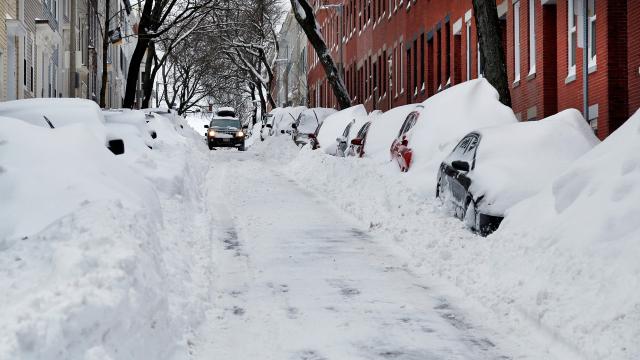By all accounts, Boston is having one hell of a winter — no seriously, just look at that picture — which has given the mayor some problems, like there’s no room left to put the snow. But it’s not just Boston: keeping cities running despite feet of snow is a problem that’s been bothering town leaders and urban planners for decades.
The two most common solutions to dealing with snow are the cheapest: salting and ploughing. Salting roads, normally with plain old sodium chloride, helps improve grip and lowers the freezing point of water substantially, down to -18C under perfect conditions. Ploughing snow normally just means removing any built-up snow to the side of the roadway, which obviously helps, because it means that there’s relatively clear road to drive on.
But it can also create a problem — if there’s a big dump of snow, or any kind of serious accumulation over time, the mounds of snow along the edge of the road become unmanageable. At best, you’ll lose a lane along the edge of a busy road; at worst, all on-street parking vanishes, major roadways get clogged up, and the road network stops functioning.
That’s where snow removal comes into play. It’s a hugely expensive process from start to finish, but in cities that see meters of snowfall per year, more or less the only option. It’s a simple enough process: generally, snow is ploughed into the middle of the street (often in the dead of night), then scooped up by a giant snowblower, and dumped into a truck.
The hard part — the part that Boston is having trouble with — is dealing with those truckloads of snow. Some cities use any available public space, like parking lots — others have designated ‘snow farms’ where they make giant piles, that often last well into the spring or early summer.
Once that space runs out, more radical solutions have to be found. Some municipalities use diesel-powered snow melters, which are expensive to buy and run, but at least provide a guaranteed solution; others do what Boston is considering, namely ploughing snow into the ocean.
For those of you wondering why waterway dumping isn’t the go-to solution, think about what’s actually in snow that’s been ploughed off the road: copious amounts of salt, oil, and probably the remnants of a foolhardy cyclist. That pollutes the ocean, and so can only be done if the snow constitutes a danger to public health — a point Boston is rapidly approaching. [BBC, Boston Globe, New York Times]
Picture: AP Images
